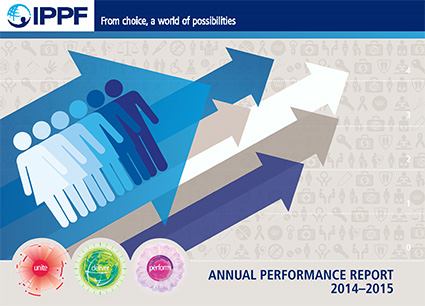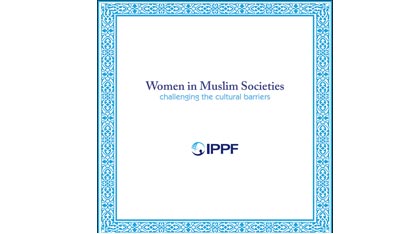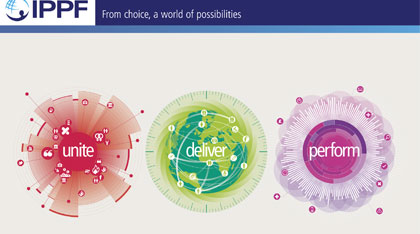
Every day some 830 women die from causes related to pregnancy or childbirth. Many more have serious injuries or long-lasting consequences.
IPPF works around the world to improve maternal health through our clinics and outreach services and by training health workers, improving the availability of essential medicines and strengthening health systems.
Articles by Maternal Healthcare

Annual Performance Report 2014-15
2014 was our third year implementing IPPF’s three Change Goals – Unite, Deliver and Perform. We have monitored the trajectory of our growth in performance to date, and are already seeing remarkable success in all three areas, as presented in our Annual Performance Report 2014-2015. Member Associations and collaborative partners in 55 countries contributed to 81 changes in policy or legislation that support or defend sexual and reproductive health and rights. At the regional and global levels, IPPF’s advocacy contributed to 18 changes, of which 12 were advances in safeguarding sexual and reproductive health and rights in the post-2015 development framework. With the delivery of 149.3 million services in 2014, we are on track to achieve our ambitious target of doubling the number of sexual and reproductive health services provided between 2010 and 2015. Over eight in ten clients who accessed services were poor and vulnerable, while almost half of our services went to young people. IPPF’s achievements in 2014 contribute to a strong performance culture where decisions are based on data, organizational learning happens at all levels, technical support is provided to increase effectiveness, and investments are made to support communities most in need.
At a Glance 2013
Key facts and figures highlighting IPPF's achievements in 2013. IPPF provided 136.6m sexual and reproductive health services and averted 580,000 unsafe abortions.

Annual Performance Report 2013-14
2013 was our second year implementing IPPF’s three Change Goals – Unite, Deliver and Perform. We have monitored the trajectory of our growth in performance to date, and are already seeing remarkable success in all three areas, as presented in our Annual Performance Report 2013-2014. Member Associations in 66 countries contributed to 97 changes in policy or legislation that support or defend sexual and reproductive health and rights. At the regional and global levels, IPPF’s advocacy contributed to 13 changes, of which ten were advances in safeguarding sexual and reproductive health and rights in the post-2015 development framework. With the delivery of 136.6 million services in 2013, we are on track to achieve our ambitious target of doubling the number of sexual and reproductive health services provided between 2010 and 2015. Eight in ten clients who accessed services were poor and vulnerable, and for the first time ever, almost half of our services went to young people. IPPF’s achievements in 2013 contribute to a strong performance culture where decisions are based on data, organizational learning happens at all levels, technical support is provided to increase effectiveness, and investments are made to support communities most in need.

Vision 2020 Landmark Report
This report – the first in our Vision 2020 series – focuses on why sexual and reproductive health and rights should be at the core of sustainable development from the outset. Without them, the lives of women and girls will be compromised, as will people’s ability to lift themselves out of poverty and to live sustainably within their resources. Our focus for this first report is goal 1 of Vision 2020 which calls on governments to ensure that by 2015 a new international framework includes sexual and reproductive health and rights as essential priorities.
At a Glance 2012
Key facts and figures highlighting IPPF's achievements in 2012. IPPF provided 112.7m sexual and reproductive health services and averted 550,000 unsafe abortions.

Vision 2020 Manifesto
In 2000 the United Nations launched the Millennium Development Goals. The world agreed to take action against poverty. Although progress has been made, we are still far from eradicating poverty. Sexual and reproductive health and rights (SRHR) are central to this vision. Sustainable development and gender equality will be achieved when everyone has access to sexual and reproductive health, the right to bodily integrity, and control over all matters related to their sexuality. Millions of lives have been saved and changed through reproductive health services. In many regions, laws and policies are in place to protect reproductive rights and prevent discrimination against women and girls. However, despite these advances there are still challenges: global funding for SRHR has decreased radically while 222 million women and girls world-wide still lack access to the contraceptives they want to use. The next few years will see the creation of a new development framework. This presents us with an unparalleled opportunity to secure a world of justice, choice and well-being for all. Ultimately, it will lead to sustainable development. IPPF is inviting partners and supporters in the development community and beyond to make these goals a reality in every community around the world. Sign up today to pledge your support. We'll keep you informed with latest news and details on how you can get involved.
At a Glance 2011
Key facts and figures highlighting IPPF's achievements in 2011. IPPF provided 89.6m sexual and reproductive health services and averted 710,000 unsafe abortions.

Women in Muslim societies
In countries with predominant Muslim populations, targets for the Millennium Development Goals on improving maternal health are lagging. IPPF is committed to a rights based approach for advancing women's health through cultural sensitivity.

Annual Performance Report 2011-12
2012 is IPPF’s 60th year. The Annual Performance Report confirms, once again, IPPF’s vital role in human development. It opens with an overview of the external challenges that threaten sexual and reproductive health and rights (SRHR). Despite these challenges, IPPF continues to deliver impressive results. In 2011, Member Associations contributed to 116 policy and/or legislative changes in support or defence of sexual and reproductive health and rights (SRHR). The Federation as a whole provided 89.6 million SRH services with the majority going to the poor and vulnerable, including young people. Robust systems and processes have ensured that money has been invested cost-effectively where it is most needed.
At a Glance 2010
Key facts and figures highlighting IPPF's achievements in 2009. Sexual and reproductive ill health causes over 30% of the global burden of disease among women of childbearing age and without IPPF, this burden would be even greater.
Pagination
- Previous page
- Page 7
- Next page







